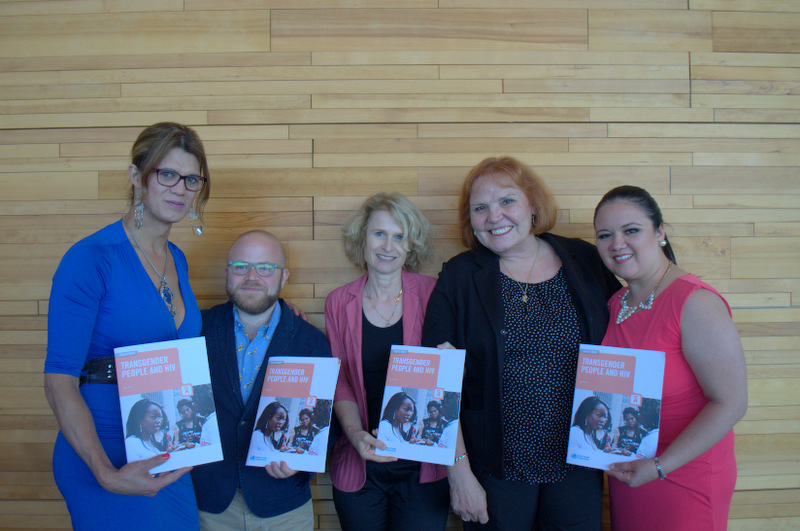Event Date
Written by Molly Goggin-Kehm, Technical Officer, LINKAGES
“We have the roadmap to end HIV. We just need to follow it,” stated Chris Beyrer, International AIDS Society (IAS) president, in the opening session of the eighth annual IAS Conference, which was followed by a thunderous applause. This year more than 6,000 delegates from across the globe gathered in July in Vancouver to attend the 2015 IAS Conference. Scientists, clinicians, public health experts, community leaders, and media professionals met to examine and share the latest scientific developments in HIV-related research and explore implementation of programs in the field. The conference delegates were dynamic and diverse. It was fitting that the IAS was taking place in one of the most international cities in the world. The sessions were filled with just as much diversity. Sessions were given on microbicides, co-infections, PrEP, and gender, while discussions on innovative strategies involving everything from mobile technology to biomedical interventions continued long after the closing sessions each day.

Featured from left to right: Rafaelly Wiest, Trans group Marcela Prado; Ayden Scheim, Gay/Bi/Queer/Trans Men’s Working Group & Gay Men’s Sexual Alliance; Annette Verster, World Health Organization; JoAnne Keatley, Center of Excellence for Transgender Health; Esmeralda Roman-Mar: Clínica Condesa.
This year was a monumental year at the IAS for key populations; more sessions than ever had components dedicated to key population research and programs. This year, LINKAGES — in partnership with the WHO, PAHO, UNFPA, and the Center of Excellence for Transgender Health — planned a session dedicated to transgender health. Never before has more attention been paid to the trans community at the IAS, and this was made apparent when our session was moved from being an affiliated independent event of the conference to one of the core sessions. However, while there has justifiably been much celebration recently on advancements in the transgender community, just a week before the IAS conference two trans speakers from African and Asia were denied Canadian visas. This serves as a reminder that trans women and men around the world continue to face challenges at all levels when their documents do not reflect their gender identity. Yes momentum is shifting, but there is still a long way to go.
The session, TRANS-forming Health Care, took place on July 20. More than 100 participants filled the room to listen to and participate in this discussion on the challenges and advancements in transgender health. The session included a provider, Dr. Esmeralda Roman-Mar from La Clínica Condesa in Mexico; a researcher, Ayden Scheim, Western University, Canada; an activist, Rafaelly Weist, Brazil; and a policymaker, Annette Verster, from WHO. The chair, JoAnne Keatley, director of the Center of Excellence for Transgender Health, began the session by highlighting key issues in transgender health, particularly noting the diversity among all types of trans people, and their integral part in the human experience. The challenges that trans people face are daunting and governments worldwide have been slow to respond to the health and human rights of trans people. However, Dr. Esmeralda Roman-Mar and Rafaelly Weist gave hopeful clinical and programmatic updates, discussing the success of ART adherence among trans women at La Clínica Condesa as well as multiple projects in Brazil that have helped trans people through building social support, encouraging behavior change, and providing peer-to-peer HIV oral testing. Ayden Scheim discussed the particular needs of trans men, specifically how trans men who have sex with men are often not given the same health care as other MSM, and often are not included in research studies. JoAnne Keatley opened a discussion on PrEP for trans people by discussing the dearth of evidence in this area despite its ability to greatly affect the trans community, which carries the largest percentage of the HIV burden. Finally, Annette Verster discussed the new WHO documents that include a tool for setting and monitoring targets and a policy brief on trans people and HIV. The session highlighted the many advancements in transgender health, but we know that trans people cannot access health care and achieve health benefits in the absence of an enabling environment that is supportive of all types of people.
As the IAS came to a close, I left the conference knowing I had been a part of something very special. Being in the presence of so many pioneers in field of HIV treatment and prevention was a unique experience. Moving forward, there will inevitably be bumps in the road and we still have a long way to go to end the epidemic, but we now know we are going in the right direction.
